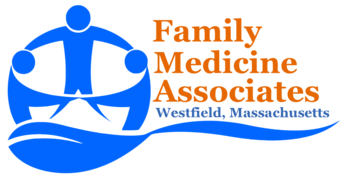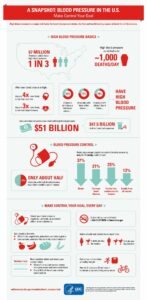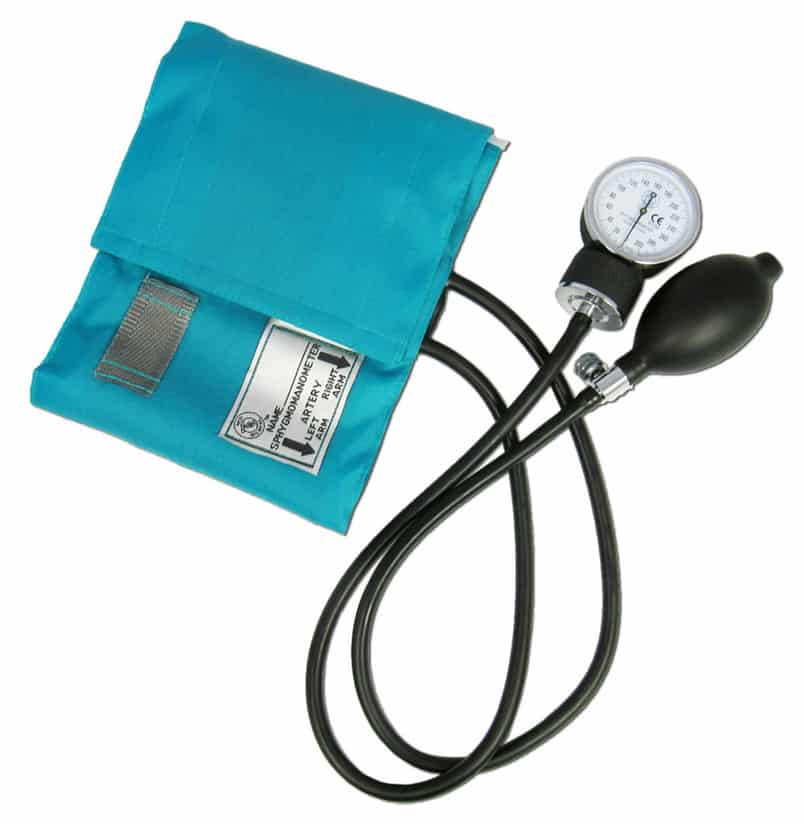
May is National High Blood Pressure Education Month
The Centers for Disease Control and Prevention (CDC) have designated the month of May as National High Blood Pressure Education Month. According to the American Heart Association, 1 in 3 American adults has high blood pressure or hypertension. Uncontrolled high blood pressure can lead to stroke, heart attack, heart failure or kidney failure. 1 in 3.1) That makes high blood pressure a very high public health priority.
Here’s what you should take away from this article: High blood pressure is a very common and dangerous condition. The good news is – you can take steps today to control your blood pressure and lower your risk of heart disease, stroke, and other major health risks. The key to controlling blood pressure is regular monitoring, consultation with your healthcare provider, and following a plan designed to lower your blood pressure. Here’s some information that we hope will prompt you to take action.
We stated earlier that about 1 of 3 U.S. adult have high blood pressure. Of high concern is the fact that of those with high blood pressure, only about half (47%) of these people have their high blood pressure under control.
High blood pressure is called the “silent killer” because it often has no warning signs or symptoms. Many people have high blood pressure and do not know it. That’s why it is important to check your blood pressure regularly.
Infographic courtesy of Centers for Disease Control and Prevention: Division for Heart Disease and Stroke Prevention (DHDSP) https://www.cdc.gov/bloodpressure/infographic.htm
Content source: National Center for Chronic Disease Prevention and Health Promotion, Division for Heart Disease and Stroke Prevention
What is Blood Pressure Screening & Counseling?
Blood pressure screening & counseling is a service provided by Family Medicine Associates which is designed to screen patients whose health may be at risk due to high blood pressure and the conditions/risks related to hypertension (i.e., heart disease, stroke, kidneys, retina/vision, arteries, and more) .
During your visit, your provider will record your age, height, weight and waist circumference, as well as medical and family health information. After this, the provider or a Medical Assistant will take your blood pressure using an arm cuff. A blood test will also be performed in order to screen for other heart health conditions.
Based on the results, you will receive counseling about the risk factors associated with hypertension and your provider may recommend lifestyle changes (to help you reduce your blood pressure). If you do have high blood pressure, your condition will be monitored and managed by your Primary Care provider.
Who is blood pressure screening & counseling recommended for?
This service is recommended for all patients over 18 years of age who have not previously been diagnosed with hypertension. Remember – hypertension is often a symptomless condition. You could have high blood pressure/hypertension (along with the associated risks) and be unaware. A blood pressure screening is the only way to know.
What to know before your visit
If the main reason for your appointment is to check for high blood pressure
then to get the most accurate measurement you should:
- Use the toilet before your blood pressure screen to empty your bladder.
- Avoid eating drinking caffeinated beverages within an hour of your visit
- Avoid smoking for one hour before your test.
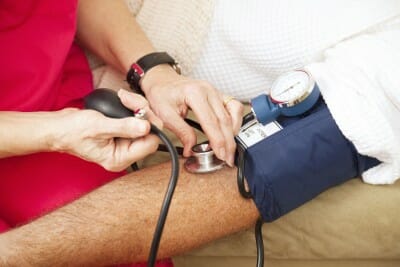
What to Expect At Your Visit – Your Provider Will:
- Review your medical history and ask you about your lifestyle.
- Perform an exam and tests based on your
individual needs. This may include the following: - Blood pressure check
- Body mass index (BMI)
- Cholesterol test
- Kidney function check
- Discuss your results and provide recommendations to help you successfully manage your blood pressure.
- Provide you with a summary and educational material.
Blood Pressure Categories
The FIVE blood pressure ranges as recognized by the American Heart Association are:
Normal Blood Pressure: Less than 120/80 mm Hg
Prehypertension: From 120-139/80-89 mm Hg. This is an early stage of elevated blood pressure, which can be considered Moderately High. Discuss your options with your Provider.
Hypertension – Stage 1: Ranging from 140-159/90-99 mm Hg. Blood pressure in this range needs to be treated. Consult with your Provider.
Hypertension – Stage 2: Ranging at levels greater than 160/100 mm Hg. As with Stage 1, blood pressure in this range needs to be treated by your Provider.
Hypertensive crisis: Blood pressure is higher than 180/110 mm. Your provider can give you information about Hypertensive Crisis and what to do if your blood pressure ever becomes elevated to this range or higher.2)
More About Blood Pressure Numbers
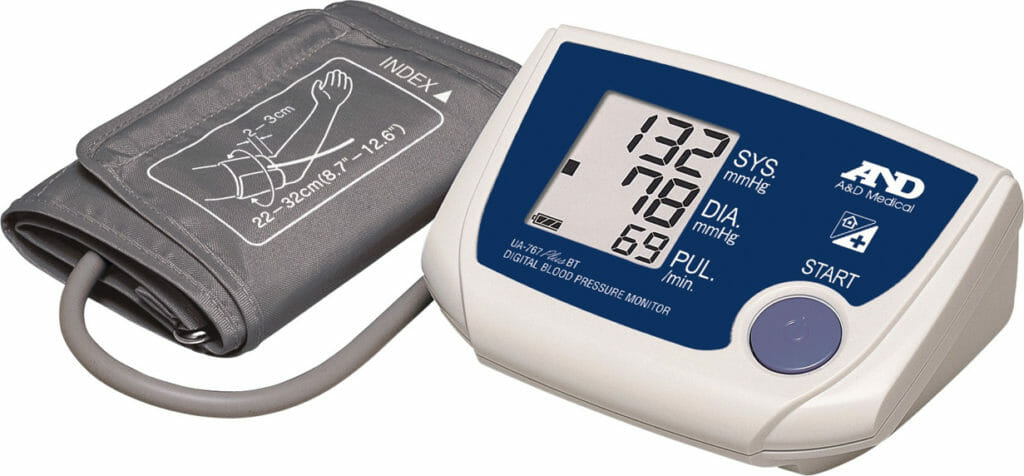
There are two numbers:
Systolic (the upper number) — how much pressure your blood is exerting against your artery walls when the heart muscle is contracting (beating).
Diastolic (the lower number) — how much pressure your blood is exerting against your artery walls while the heart is resting (between beats).
Which number is more important?
Both Systolic and Diastolic pressure are important, and an elevation of either – or both – can be used to make a diagnosis of hypertension.
What is mm Hg ?
millimeters of mercury. Blood Pressure is measured with two numbers (i.e. 120/80 millimeters of mercury). It’s the standard unit of measurement for blood pressure.
So I have High Blood Pressure. Now What?
- Discuss your treatment options with your healthcare provider. He/She will assist with creating a plan to control your blood pressure.
- Learn how you can monitor your own blood pressure at home.
- Keep an accurate record of your blood pressure. Whether you use a paper journal or an app, keeping a record will help your provider get a better understanding of your health, over time.
- Be diligent about taking your blood pressure medication! It’s important. If you have concerns, you should discuss with your provider.
The September issue of CDC’s Vital Signs highlights the importance of awareness and treatment for adults with uncontrolled hypertension. Adults with high blood pressure can gain control by taking their blood pressure medicine. Find out why you should know your blood pressure numbers and what to do about it.3)
Cardiologist Dr. Tara Narula joins “CBS This Morning” to discuss exciting new findings about the benefits of lowering blood pressure by the New England Journal of Medicine.4)
Call Now to Schedule a Blood Pressure Screening Appointment! +1 (413) 562-5173
Stay tuned for Part 2 of Blood Pressure Screening Saves Lives
Tip: Why not print this article and bring it with you to discuss with your provider:
[printfriendly]
Sources and References
| ↩1 | High Blood Pressure Facts. (2016, November 30). Retrieved May 21, 2017, from https://www.cdc.gov/bloodpressure/facts.htm |
|---|---|
| ↩2 | ”Understanding Blood Pressure Readings” American Heart Association http://www.heart.org/HEARTORG/Conditions/HighBloodPressure/KnowYourNumbers/Understanding-Blood-Pressure-Readings_UCM_301764_Article.jsp#.WSYcOmgrJaQ |
| ↩3 | Uploaded by: Centers for Disease Control and Prevention (CDC) , YouTube.com |
| ↩4 | Uploaded by: CBS This Morning , YouTube.com |
